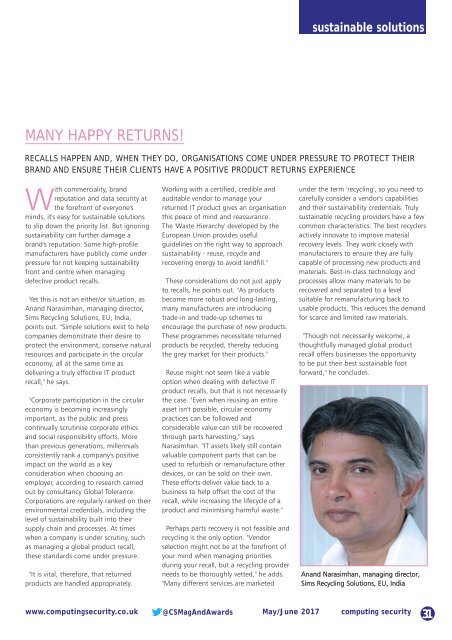CS1705
Create successful ePaper yourself
Turn your PDF publications into a flip-book with our unique Google optimized e-Paper software.
sustainable solutions<br />
MANY HAPPY RETURNS!<br />
RECALLS HAPPEN AND, WHEN THEY DO, ORGANISATIONS COME UNDER PRESSURE TO PROTECT THEIR<br />
BRAND AND ENSURE THEIR CLIENTS HAVE A POSITIVE PRODUCT RETURNS EXPERIENCE<br />
With commerciality, brand<br />
reputation and data security at<br />
the forefront of everyone's<br />
minds, it's easy for sustainable solutions<br />
to slip down the priority list. But ignoring<br />
sustainability can further damage a<br />
brand's reputation. Some high-profile<br />
manufacturers have publicly come under<br />
pressure for not keeping sustainability<br />
front and centre when managing<br />
defective product recalls.<br />
Yet this is not an either/or situation, as<br />
Anand Narasimhan, managing director,<br />
Sims Recycling Solutions, EU, India,<br />
points out. "Simple solutions exist to help<br />
companies demonstrate their desire to<br />
protect the environment, conserve natural<br />
resources and participate in the circular<br />
economy, all at the same time as<br />
delivering a truly effective IT product<br />
recall," he says.<br />
"Corporate participation in the circular<br />
economy is becoming increasingly<br />
important, as the public and press<br />
continually scrutinise corporate ethics<br />
and social responsibility efforts. More<br />
than previous generations, millennials<br />
consistently rank a company's positive<br />
impact on the world as a key<br />
consideration when choosing an<br />
employer, according to research carried<br />
out by consultancy Global Tolerance.<br />
Corporations are regularly ranked on their<br />
environmental credentials, including the<br />
level of sustainability built into their<br />
supply chain and processes. At times<br />
when a company is under scrutiny, such<br />
as managing a global product recall,<br />
these standards come under pressure.<br />
"It is vital, therefore, that returned<br />
products are handled appropriately.<br />
Working with a certified, credible and<br />
auditable vendor to manage your<br />
returned IT product gives an organisation<br />
this peace of mind and reassurance.<br />
The 'Waste Hierarchy' developed by the<br />
European Union provides useful<br />
guidelines on the right way to approach<br />
sustainability - reuse, recycle and<br />
recovering energy to avoid landfill."<br />
These considerations do not just apply<br />
to recalls, he points out. "As products<br />
become more robust and long-lasting,<br />
many manufacturers are introducing<br />
trade-in and trade-up schemes to<br />
encourage the purchase of new products.<br />
These programmes necessitate returned<br />
products be recycled, thereby reducing<br />
the grey market for their products."<br />
Reuse might not seem like a viable<br />
option when dealing with defective IT<br />
product recalls, but that is not necessarily<br />
the case. "Even when reusing an entire<br />
asset isn't possible, circular economy<br />
practices can be followed and<br />
considerable value can still be recovered<br />
through parts harvesting," says<br />
Narasimhan. "IT assets likely still contain<br />
valuable component parts that can be<br />
used to refurbish or remanufacture other<br />
devices, or can be sold on their own.<br />
These efforts deliver value back to a<br />
business to help offset the cost of the<br />
recall, while increasing the lifecycle of a<br />
product and minimising harmful waste."<br />
Perhaps parts recovery is not feasible and<br />
recycling is the only option. "Vendor<br />
selection might not be at the forefront of<br />
your mind when managing priorities<br />
during your recall, but a recycling provider<br />
needs to be thoroughly vetted," he adds.<br />
"Many different services are marketed<br />
under the term 'recycling', so you need to<br />
carefully consider a vendor's capabilities<br />
and their sustainability credentials. Truly<br />
sustainable recycling providers have a few<br />
common characteristics. The best recyclers<br />
actively innovate to improve material<br />
recovery levels. They work closely with<br />
manufacturers to ensure they are fully<br />
capable of processing new products and<br />
materials. Best-in-class technology and<br />
processes allow many materials to be<br />
recovered and separated to a level<br />
suitable for remanufacturing back to<br />
usable products. This reduces the demand<br />
for scarce and limited raw materials.<br />
"Though not necessarily welcome, a<br />
thoughtfully managed global product<br />
recall offers businesses the opportunity<br />
to be put their best sustainable foot<br />
forward," he concludes.<br />
Anand Narasimhan, managing director,<br />
Sims Recycling Solutions, EU, India<br />
www.computingsecurity.co.uk @CSMagAndAwards May/June 2017 computing security<br />
31

















